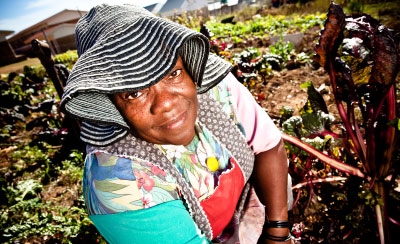
The empowerment of women in agriculture is crucial if agriculture is to remain one of the most important economic sectors in Africa said former Nigerian President, H.E Olusegun Obasanjo at the Stakeholders’ Technical Meeting on Empowering Women in Agriculture (EWA) Regional Program Document (PRODOC) held in Dakar, Senegal on 27-28 April 2016.
“For there to be transformation in the agriculture sector, the economic empowerment of women through boosting their productivity and raising their participation in commercial and higher value-adding activities in agriculture is central,” said H.E. Obasanjo, who chaired the meeting.
H.E. Obasanjo has been part of the EWA Initiative since its launch in 2012. As a farmer, he says he understands the value of going back to the land and believes that women and youth are the key actors in unlocking the potential of African agribusiness. He said it was now time for action rather than rhetoric on issues relating to women empowerment in Africa.
The EWA initiative was officially launched on the side-lines of the 19th African Union Summit in Addis Ababa, Ethiopia on 15th July 2012 and is co-chaired by the President of Liberia, H.E. Ellen Johnson-Sirleaf and President of Burkina Faso, H.E. Blaise Compaore.
EWA initiative was established by Femmes Africa Solidarité (FAS) and the Gender is my Agenda Campaign Network (GIMAC) in partnership with the African Capacity Building Foundation (ACBF) and the Mo Ibrahim Foundation. The initiative is concerned about the lack of integration of women farmer’s interests in the ongoing programmes for agricultural transformation in Africa, making gender to remain on the periphery of the growth process instead of being at the heart of it, given the critical role of women in the continent’s agriculture.
“The ACBF looks forward to a more vibrant and strong partnership around the initiative in order to quickly lift up the majority of the women population out of poverty,” said Dr. Roger Atindehou Manager, East and Southern Africa at the ACBF. He was speaking on behalf of the ACBF’s Executive Secretary, Prof Emmanuel Nnadozie.
He explained that the essence of convening the technical meeting was critical in validating the content of the Regional Program, sharing experiences in the design, and the preparation of the project in each pilot country and to agree on key features of the regional EWA program document.
Dr. Atindehou made a call for the stakeholders’ invaluable contribution for the improvement of the Project document. He ended with the statement that for women to be truly empowered in agriculture and for change to effectively happen on the Continent, a strategy of engagement partnership in which the domains of empowerment are clearly defined, and roles are shared among partners is required.
According to H.E. Obasanjo, African governments need to do the right thing and need to put in place more strategic actions with the consideration of EWA as the starting point. He requested that Nigeria and one country in Central African Region be added to the eight pilot countries – (Burkina Faso, Djibouti, Ethiopia, Liberia, Malawi, Rwanda, Senegal and Tanzania respectively) to make the make it more representative of the African continent.
The meeting was jointly organized by the ACBF and the Femmes Africa Solidarité and hosted by the International Finance Corporation (IFC). This followed the preparatory work and development of national project documents in the eight pilot countries and synthesized into the regional program document.
The event gathered high-level participants, including stakeholders from policy think tanks, civil society organizations, women and youth associations, development partners like the United Nations agencies such as Economic Commission for Africa (UNECA), UN Women, Food and Agriculture Organization (FAO), OXFAM, African Development Bank (AfDB), the International Finance Corporation, the New Partnership for Africa's Development (NEPAD), private organizations like the OCP Morocco, Dangote group of companies, and public sector officials from the countries piloted in the regional program – Burkina Faso, Djibouti, Ethiopia Faso, Liberia, Malawi, Rwanda, Senegal and Tanzania respectively.





